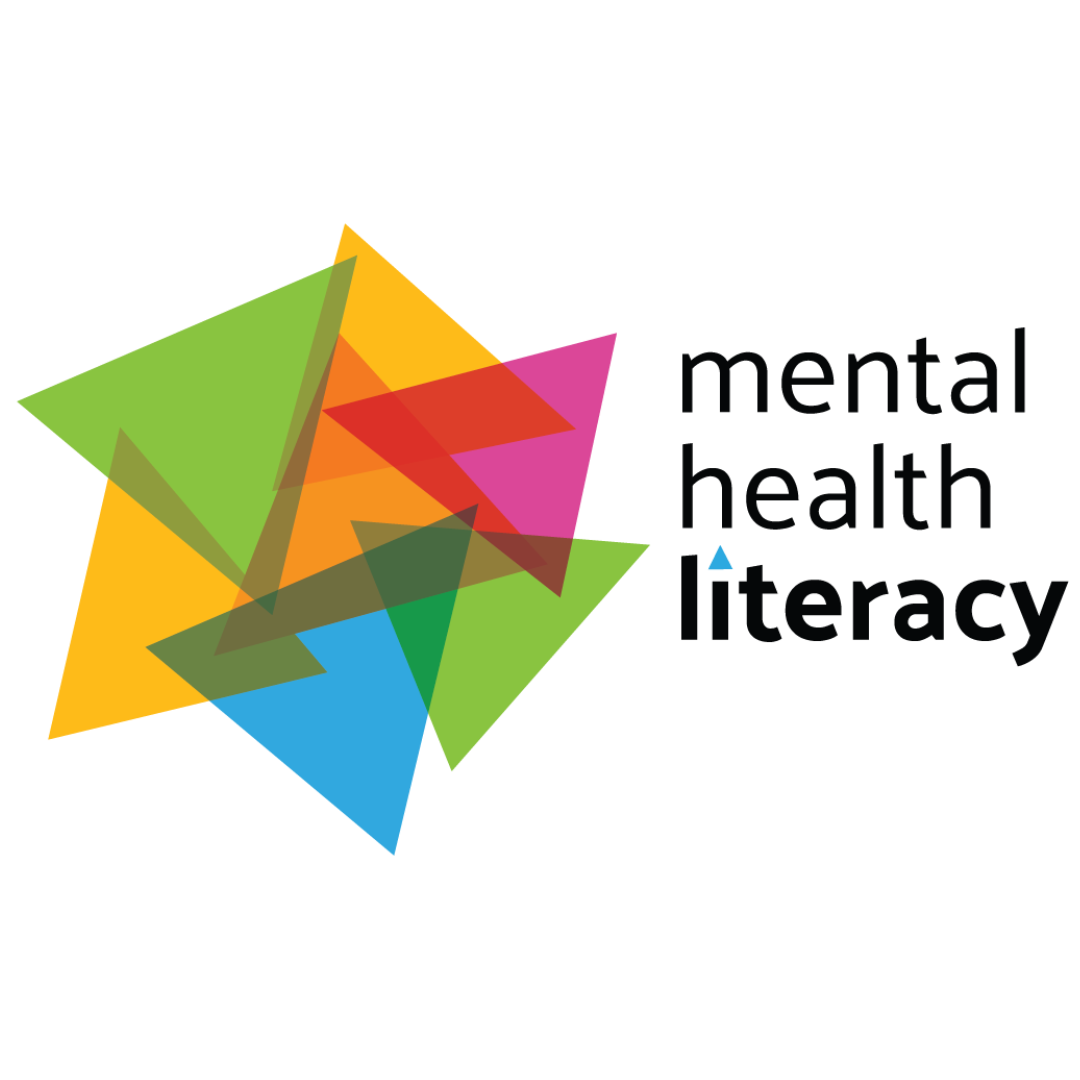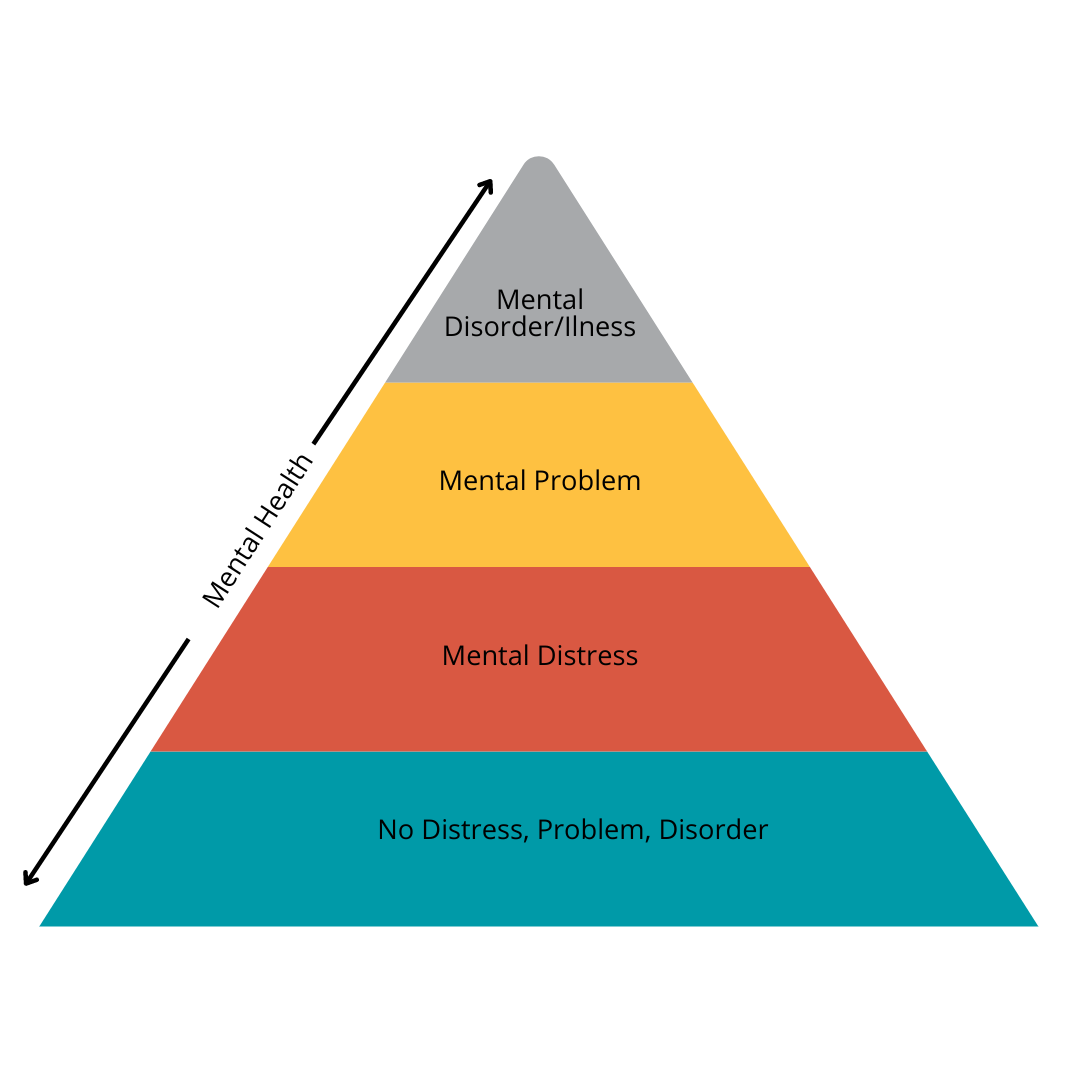About Mental Health
Mental health is a complex and important part of our overall health that is not always understood. However, furthering our knowledge in this area is empowering and helps us make informed decisions about our own health. The following information explains mental health concepts in a plain and accessible way. This is information that all Canadians can benefit from and it has been reproduced with permission from MentalHealthLiteracy.org
Important Terms
UNDERSTANDING MENTAL HEALTH
WHAT IS MENTAL HEALTH?
Mental Health can be understood as "having the capacity to be able to successfully adapt to the challenges that life creates for people" [2] It is our brain that learns, recalls and executes these capacities through its enablement of our emotions, thinking and behaviours that help us adapt to these life challenges and opportunities. Too often, mental health has been considered to mean "feelings happy" or "feeling good". Mental health is not about feeling good all the time. It consists of a wide range of situationally appropriate states that include negative, neutral and positive emotions and thoughts. For example, feeling upset after a conflict with a friend is not a sign of poor mental health. It is a situationally appropriate response, which is a part of good mental health.
Good 'mental health' is essentially 'good brain health; the brain and the rest of the body cannot be separated. Understanding this connection and supporting mental health through paying attention to our physical health, and vice versa, is essential. Remember that mental health is not the opposite of mental illness. Individuals with a mental illness still have mental health. In fact, many individuals with a mental illness may have better mental health than those without. They have had to learn coping skills that may make them more adaptable to life's challenges than those who have not learned such skills.
It is important to consider the 4 interrelated categories illustrated in the diagram below.
[2]WORLD HEALTH ORGANIZATION (WHO) FACT SHEETS. ACCESSED MAY 5, 2021. https://mentalhealthliteracy.org/product/mhl-pyramid/
MENTAL DISTRESS
Mental Distress (popularly referred to as 'stress') is a signal from our brain and body that we are facing a challenge in our environment that we need to change or adapt to. This is a normal, expected and indeed necessary part of adapting to our environment. Examples may include giving an important speech, arguing with a colleague, driving through a winter storm, having a conflict in a personal relationship, meeting a deadline or the challenges of daily living during a pandemic. In addition to what may often be intense thoughts and feelings (such as feeling worried, frantic, unhappy, aroused), mental distress may manifest with physical symptoms such as headaches, stomach aches and restlessness.
Mental distress is common in our everyday lives. By successfully responding to these stressors we problem solve, develop new skills, successfully adapt to changing circumstances and build resilience. Avoiding everyday stressors may interfere with the learning of necessary adaptive skills.
Sometimes learning can be painful and challenging, but that does not mean that it should be avoided or that the experience of distress requires professional intervention. Support from family, friends and colleagues provides us with what we need to help us address life's challenges and learn how to become resilient.
MENTAL HEALTH PROBLEM
Mental Health problems arise when we encounter a situation that overwhelms our coping mechanisms for an extended time. These are typically substantial life stressors (such as divorce, death of a loved one, loss of employment) that are typically accompanied by intense, prolonged and situationally appropriate negative emotions (such as anger, grief, or hopelessness) and negative thoughts (e.g. "I'm not good enough", "this will never get better", or "it's hopeless"). Physical symptoms such as insomnia, fatigue, muscle pains and loss of appetite frequently occur.
Everyone at some point in their life will encounter a mental health problem that will negatively impact their day to day functioning. Mental health problems can be mitigated through support from personal relationships, support from organizations we belong to (such as religious communities), speaking with a counsellor, or simply the passage of time. Mental health problems are not mental illnesses and they do not typically require psychiatric intervention, but assistance from a health professional is often helpful.
MENTAL ILLNESS
A mental illness (also known as a mental disorder) is a medical condition that is diagnosed by a trained health professional (such as a family physician, psychiatrist, or psychologist) using internationally established diagnostic criteria. Mental Disorders/Illnesses arise from complex interactions between genetic and environmental factors and are rarely caused by one factor alone. Some examples of mental disorders are: Schizophrenia: Bipolar Disorder; Major Depressive Disorder; Anorexia Nervosa; Obsessive Compulsive Disorder. Worldwide, 15-20 % of the population will have a mental illness [3].
People with a mental illness need rapid access to proven effective treatments. Most people who receive the best available care show significant improvement, can learn to manage their illness and lead productive and successful lives. Just like some other chronic diseases, some mental illnesses may not respond to available treatments and may progress into severe, prolonged and intractable conditions.
Use the Right Words!
We can confuse others and ourselves with how we talk about mental health. Be careful not to use the phrase "mental health" if we mean "mental illness." There is no stigma against mental health but there is stigma about mental illness. Don't use words that suggest pathology to describe normal emotional states. For example, instead of saying you are depressed, identify if you are sad, disappointed, discouraged, disheartened etc. Instead of saying you have anxiety, identify if you are feeling tense, unsettled, perturbed, worried, nervous, distraught etc. Try to use the words that most clearly describe the nuanced feelings you are having.
Remember: successfully dealing with emotions begins by correctly naming them.
For more evidence-based information about using the right words, access these free resources:
Language Matters: The Importance of Using the Right Words When We're Talking About
Mental Health (English downloadable pdf): https://mentalhealthliteracy.org/schoolmhl/wp-content/uploads/2019/01/final-using-the-right-words.pdf
Language Matters: The Importance of Using the Right Words When We're Talking About
Mental Health (French downloadable pdf): https://mentalhealthliteracy.org/schoolmhl/wp-content/uploads/2020/05/final-using-the-right-words-french.pdf
What is Treatment and When is it Needed?
Similar to all illnesses, treatment for mental disorders should be based on best available clinical research and provided by properly trained health care professionals. Treatments involve psychological (such as cognitive behavioural therapy) physical (such as medications) and psychosocial (such as supported housing) interventions. More than one type of treatment may be provided and these should be tailored to the needs of the individual and properly monitored to evaluate outcomes and any adverse effects that may occur.
All treatments aim to reduce symptoms, improve functioning and prevent recurrence. A respectful relationship between provider and recipient is key. Family members may be involved if appropriate or necessary. Most treatments take some time to become effective and providing information about treatment options and components should be a core element of treatment provision.
Applying common self-care interventions (such as exercise and sleep hygiene) can complement but not replace evidence- based treatments.
Knowing what questions to ask your healthcare provider can help you better understand and make decisions about your treatments.
For more information about Evidence-Based Medicine, access these free resources:
What is Evidence-Based Medicine? (English downloadable pdf): https://mentalhealthliteracy.org/product/evidence-based-medicine-patients/
Evidence-Based Medicine Part 1: Talking with Your Healthcare Provider (short animated video): https://www.youtube.com/watch?v=YMmgzhON14U
Evidence- Based Medicine Part 2: Becoming Health Information Savvy (short animated video): https://www.youtube.com/watch?v=YMmazhONI4Ux
Communicating with Your Healthcare Provider: What Every Person Should Ask (English downloadable pdf): https://mentalhealthliteracy.org/product/communicating-health-care-provider-every-person-ask/
Mental Health Literacy Pyramid
For more evidence-based information about the interrelated mental health states, you can access this free resource:
• Mental Health Literacy Pyramid Explained (short animated video): https://www.youtube.com/watch?v=VgYmIsYmUIU
Read Next: Obtaining and Maintaining Good Mental Health



